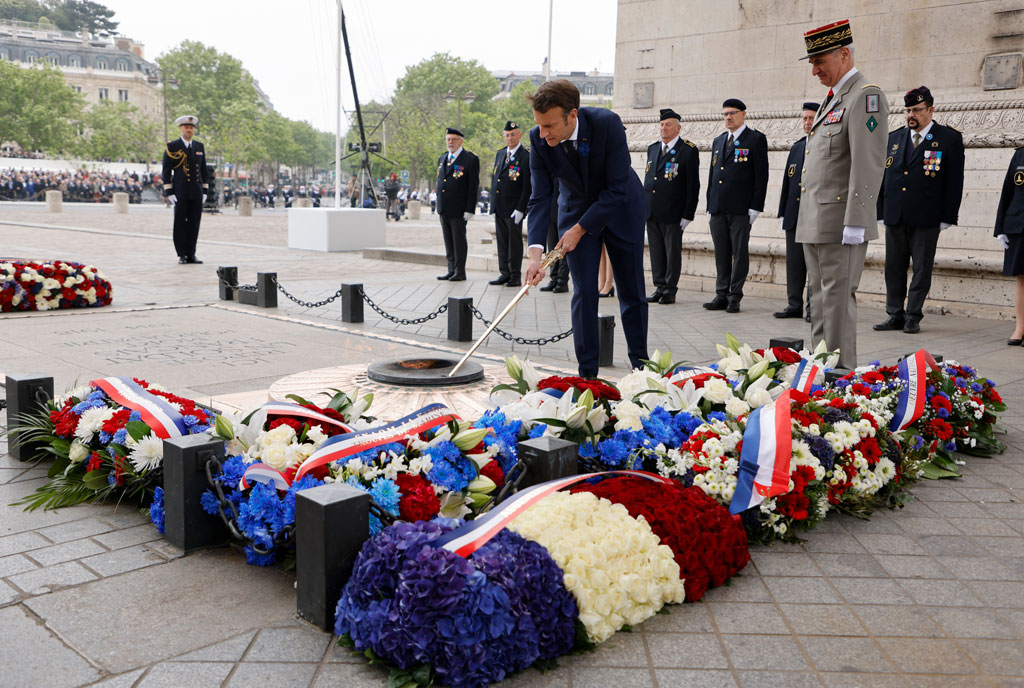Remembrance, reconciliation for the lives lost during World War II

France's President Emmanuel Macron (C) lights the flame on the tomb of the unknown soldier at the Arc de Triomphe as part of ceremonies marking the Allied victory against Nazi Germany and the end of World War II in Europe (VE Day), in Paris on May 8, 2022. PHOTO/AFP
What you need to know:
- Speaking out can also ensure that this war does not become an example for other authoritarian regimes to invade their neighbours.
On May 8, 77 years ago, World War II and the terror of the Nazi regime ended. The former President of Germany, Richard von Weizsäcker, called this day the “Day of Liberation”.
Indeed, Germany and Europe were finally liberated from the rule of a ruthless criminal regime that followed a sick ideology and was responsible for the death and suffering of many millions of people.
Although the vast majority of the German population was, of course, relieved that the war was over, they would not have referred to this utter defeat by the allied forces as a “liberation”. It took more than two generations for most Germans to be able to really embrace the idea that this defeat was in fact a liberation.
Since authoritarian thinking was deeply rooted in many brains, this liberation had to come from outside and needed quite some time to sink in. It was an often painful path to shed light on this gruesome part of German history, to reassess it and to take collective and individual responsibility for it.
Fortunately, many of its former enemies were willing to forgive and to place new trust in a new Germany, first and foremost the USA and France. They were willing to reach out, to renew ties and to support Germany on its way back to the enlightened world.
May 8 is a day of remembrance for those who lost their lives during World War II. Why is this important 77 years after the war is over? Remembrance is never over! Our history is still part of our identity. To try to push it aside instead of learning from it is to risk our future. Remembering the dark moments of history is often felt as a burden. But refusing to face it will surely become a burden sooner or later.
If we want to move forward in the right direction, we first have to look back and own up to our mistakes. And in the face of the barbaric crimes committed by the Nazis, we must surely promise the victims that we will never forget them.
Freedom from oppression comes with responsibility. Peace and freedom need to be nurtured and defended. Although it may seem contradictory to have to fight for peace, this is what history teaches us.

Mayor of Wageningen Floor Vermeulen (C-L) lights a torch flanked by 96-year-old British World War II veteran Harry Rawlings (C-R) during the liberation fire ceremony at Hotel De Wereld in Wageningen on May 5, 2022 The ceremony symbolises the transition from commemorating war victims to celebrating freedom. PHOTO/AFP
Europe fought for its freedom. Its founding fathers believed in a Europe liberated from war. Their aspiration to see the emergence of sovereign nations freely choosing their future together, in solidarity, has been fulfilled with the European Union. What we see today is that this aspiration is being challenged by nationalistic chauvinism, xenophobia, fascination with authoritarian leaders, and contempt for democracy, rule of law and human rights. As Germany and France, together with a strong Europe, we are determined to act against such murderous mindset. Everybody is called upon to resist and speak out against such policies, especially in remembrance of the victims of the war.
Today we are witnessing the continued invasion of Ukraine that Russia started on February 24, just over two months ago. The freedom of a sovereign country is no longer being respected and civilians are being deliberately targeted.
It is the responsibility and obligation of all those who believe that people have the right to live in freedom to speak out clearly against this war in order to bring it to an end as quickly as possible.
As Bishop Desmond Tutu once put it: “if you are neutral in situations of injustice, you have chosen the side of the oppressor.”
Speaking out can also ensure that this war does not become an example for other authoritarian regimes to invade their neighbours.
Peace deserves our constant mobilisation, this is what remembrance is also about.
Co-authered by the German Ambassador, Matthias Schauer & the French Ambassador, Jules-Armand Aniambossou




